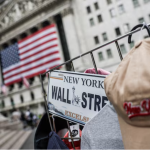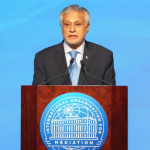“HERE WE GO” is the first line of the 2025 Amazon Prime movie War of the Worlds, and it’s also exactly what I muttered when I chose to watch it despite the overwhelming amount of reviews that warned me against it.
Director Rich Lee’s War of the Worlds, which was only filmed from the perspectives of online calls and surveillance feeds, centers on Ice Cube’s character, domestic terror analyst William Radford, who is committed to defending his family and the country against alien cyborgs who want to use our data literally.
At first glance, the film’s 3 percent rating on Rotten Tomatoes, which is higher than its initial 0 percent rating, seems both spectacular and predictable. Even though getting a rating below 5 percent seems like a difficult feat, remaking a classic (The War of the Worlds, from 1953, has an 89 percent rating on Rotten Tomatoes) sets some pretty high expectations. Even the most sympathetic audience will laugh when you combine that with watching an action film through the lens of poor computer graphics and Microsoft Teams meetings.
Even if you overlook the images and clearance issues (I mean, really, why were all the faces blurred out?), the tech-based plot flaws that bordered on propaganda weakened the film’s message about the importance of human connection. The most striking examples are the differences in access to technology after the data-hungry aliens took down Earth’s satellites.
News networks, Starlink satellites, X feeds, and Amazon purchase access survive a few scenes later with little to no explanation, despite the psychological and physical harm caused by military weapons, automobile GPS systems, and Facebook page outages. Radford’s office is locked when he tries to flee to save his daughter after the building is placed under another air-sealed lockdown, but it is somehow open when he needs to hack the data servers in the basement. The most ridiculous is that a thumb drive that could save the world can be transported to the DHS facility by a Prime Air drone without causing catastrophic amounts of damage and chaos.
The overt promotion of internet companies doesn’t end there. Faith, Radford’s daughter and a Georgetown-educated scientist, has the brilliant idea to remove a large piece of debris from her leg, which causes an almost disastrous hemorrhage. Luckily, Mark Goodman, her boyfriend and an Amazon delivery driver, says he’s a “pro” at making a tourniquet out of packaging tape.
Even minor characters are ensnared by the Amazon Savior motif. A homeless person can only help fix the world-saving Amazon Prime Air drone that overturns on its way to the DHS headquarters after being given a $1,000 Amazon gift card.
These scenes would have been absurd enough to be written off as comedy if War of the Worlds hadn’t placed such a strong emphasis on government surveillance without addressing the part played by the computer industry. From Anonymous-style livestreams featuring the US Constitution to Radford’s cyberbullying of his children to the secret data-stealing scheme that guides extraterrestrials to Earth, the true enemy the US government and its technology—is clearly visible.
In actuality, privacy is only threatened in private companies when the government interferes. For example, Radford uses Guardian, the government’s monitoring software, to break into a Tesla and remotely transport his injured daughter to a safer location. David, Radford’s son, mocks his father at the beginning of the film, saying that all he does for a living is spy on people’s Amazon shopping carts.
Most importantly, the secret government operation Goliath, which steals data and private conversations from Americans worth billions of dollars, is the reason the alien cyborgs attacked. Internet behemoths like Jeff Bezos and Elon Musk are not mentioned in relation to controversial data collection practices, which could range from a complete digital takeover of the US government to a failure to protect personal information. That’s hardly shocking considering that it’s an Amazon movie, but it still feels like a major omission.
One good thing I can say about War of the Worlds is that Lee took a risk by rewriting a popular thriller from an online perspective. Sometimes it pays to take a chance, but this time it didn’t. The decision to criticize government surveillance and paint Big Tech as the helpless victims ultimately undermines the film’s message, making it more of a nearly 90-minute commercial for Microsoft and Amazon than a provocative movie.
But maybe all this advertising means that Prime Air will finally be available at least in Washington, DC.









